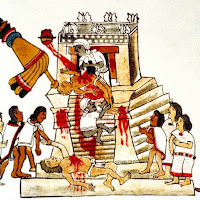 |
| Coming soon to Galway? |
Certainly
nobody is denying the dangers of overdosing on alcohol, in particular binge drinking. 76 per cent of binge drinkers suffer black outs, which impair memory,
judgement and impulse control. Though they drink less females are more likely
to suffer blackouts (with potentially greater risks ). Other dangers
include passing out from drinking which affects respiration, body temperature and
the gag reflex (which can lead to drinkers choking on vomit). Evidence suggests
that binge drinking students also suffer lower grades. Yet despite all these statistics, creating an
anti-binging scheme based on the pre-conquests penal laws of the ancient
Aztec’s has proven controversial.
‘The Aztec’s knew a thing or two about dealing with binge drinkers,’ explained government spokesperson Pierce O’Phuket. ‘Repeat offenders were thrown to the ground and then had their skulls smashed in by cudgels. That put a fecking stop to their fecking nonsense.’ Despite this alleged benefit the pilot scheme earmarked for Galway city has met with considerable opposition.
One problem is that Aztec’s did not just see drunkenness as a social problem; public inebriation also carried the danger of bringing powerful forces from the sacred realm into our world without the proper controls and rituals. Thus the punishment not only needed an element of blood sacrifice and ritual, it had to be witnessed in the heart of the town, which was the market place.
Thus permission was sought and readily given to carry out the executions once a month in the bustling Church Lane market by St. Nicholas’ Church.
The first cudgling were due to take place over the summer during the festival season, and bookings by overseas visitors had quadrupled in anticipation of the ritual slaughters. However, city historians and archaeologists then raised an important heritage objection: Galway’s executions had always taken place in the area of the city now called Eyre Square.
After much heated debate local councillors accepted that local licensing laws made it impossible to move the market over to Eyre Square. A compromised was reached in March, whereby the executions would take place at the Church Lane market, but the public dismemberment and display of bodies would happen in Eyre Square. It seemed that everything was in place to begin the executions in July. It was then the most serious objections were raised.
A closer examination of Aztec Penal Laws revealed that there was different severities of punishment for different parts of society. While the lower orders could be executed, they could also be let off with a reprimand. On the other hand the lords and rulers had no such luck. If found guilty of drunkenness they were automatically executed without any hope of redress or pardon. In Ireland of course the reverse is true: the greater financial, political or religious power a person or institution has the greater immunity they have from the country's legal and moral codes.
As I write the issue is now being thrashed out in the Oireachtas Committee on Finance, Public Expenditure and Reform. The government remains committed to introducing Aztec executions – and are seeking a way to have 'the lords and rulers' wording changed to ‘the big and bold’. The hope is, explained Mr. O’Phuket, to have legislation in place by the first week of the new semester. ‘A few handy brain baetings for those fecking big and bold GMIT and NUI Galway students will teach them whose fecking boss’.
On the plus side it could be argued that the furore over proposed public executions has helped highlight the dangers of alcohol and its effects on individuals, innocent passers-by, the health service, etc. However, it has also served to obscure the fact that there are simple solutions to reducing alcohol harm. As advocated by the World Health Organisation these include increasing price, reducing access and restricting sponsorship and advertisement. But, to quote the ever exuberant government spokesperson Pierce O’Phuket,’ Pigs will fecking fly before we allow that fecking nonsense here.’
For background information see:
Aztecs: AnInterpretation by Inga Clendinnan
Alcohol causes one in 20 deaths worldwide, says WHO Guardian article
For more on blackouts read:
Alcohol Overdose: The Dangers of Drinking Too Much
Alcohol-induced blackouts are not reserved for alcoholics
Did I do that? The psychology of alcohol-induced blackouts
Alcohol-induced blackouts are not reserved for alcoholics
Did I do that? The psychology of alcohol-induced blackouts
* * * * *
Follow Rab on Twitter @haveringrab and Instagram @celtictalesgalway
No comments:
Post a Comment